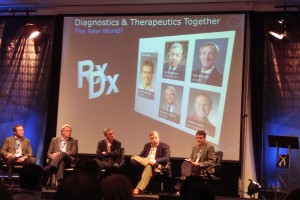Genetic testing and molecular diagnostics will be essential to wider adoption of personalized medicine by nation’s physicians
MOUNTAIN VIEW, CALIFORNIA—Here in Silicon Valley at the Personalized Medicine World Conference (PMWC), the role of clinical laboratory testing and anatomic pathology services was consistently recognized as essential in advancing this important healthcare trend. Yet, at the same time, few pathologists or clinical laboratory executives were in attendance.
Your Dark Daily Editor, Robert L. Michel, was here at PMWC this week to speak on the topic of how medical laboratories and pathology groups will be one primary—and important—channel for helping physicians adopt and use personalized medicine in their medical practice. In simplest terms, it is typically pathologists and clinical laboratory professionals who educate doctors about the availability of new clinical lab tests and how to use them in their practice of medicine.
In that role, the medical laboratory provides physicians with information on when to order these new assays, how to interpret the lab test results, and how to use those results to determine the most appropriate therapy. Yet, here at the Personalized Medicine World Conference, developers at biotech companies seem to be overlooking this long-established fact in the clinical care marketplace.
Envisioning the Era of Personalized Medicine
When it comes to personalized medicine, speakers and attendees here at PMWC are enthusiastic about its future. They eagerly look for examples of personalized medicine practices adopted by physicians and now in regular clinical use. Such examples are still limited in number and seem to center around the use of companion diagnostics to qualify patients for specific therapeutic drugs.

This panel took up the subject “Diagnostics and Therapeutics Together: The New World!” yesterday at the Personalized Medicine World Conference that took place in Mountain View, California. From Left: Walter Koch, Ph.D., Roche Molecular Systems; Pat Groody, Ph.D., Abbott Diagnostics; David Parkinson, Nodality; Ted Snelgrove, Crescendo Biosciences; and, Moderator Scott Patterson, Ph.D., Amgen.
In fact, the handful of therapeutic drugs that come with a companion diagnostic assay can probably be considered the leading edge of personalized medicine routinely used in clinical practice today. But advances in genetic and molecular knowledge about different diseases are widely expected to generate more opportunities for personalized medicine products and services.
One example was presented by Walter Koch, Ph.D., Vice President and Head of Global Research at Roche Diagnostic Systems. He discussed the FDA clearance process that was used to simultaneously move a therapeutic drug and its companion diagnostic test through FDA review and clearance. Koch pointed out that it took just 60 months for the drug velmurafanib (Zelboraf), the companion diagnostic to finish the FDA’s review and receive clearance to go to market. The IVD BRAF test is an FDA-cleared test kit that can be run on the Roche Cobas instrument.
Similarly, much attention was paid to the role of gene sequencing and molecular analysis. A number of companies presenting at PMWC are researching DNA, RNA, and proteins in selected populations in order to understand different diseases. Michael J. Pellini, M.D., CEO of Foundation Medicine, showed the audience how his company is investigating more than 200 cancer-related genes. Researchers are using formalin-fixed, paraffin-embedded tissue samples. He noted that Foundation Medicine seeks to identify genetic markers that will provide sensitivity and specificity that approaches 100%.
Pellini, who came to Foundation Medicine after working for several years at Clarient, Inc., believes the current diagnostic model is unsustainable. He described the common practice today where a hospital lab does the first testing on tissue. It then may refer that specimen to a reference lab, which, in turn, may refer that same tissue to an esoteric testing laboratory.
Pellini pointed out that this clinical workflow adds time to diagnosis, creates gaps in access to information, and often means that the oncologist who originally ordered the pathology tests, never sees all the laboratory test results produced by the three different clinical and molecular testing labs which handled that same tissue sample.
Another company working to change the standard of practice in medical laboratory testing is DNAe. In this presentation on behalf of DNAe CEO Chris Toumazou, the speaker described the company’s work to develop a semiconductor-based genetic assay platform. This system uses a very small specimen sample, requires one minute of hands-on time by the operator (who needs no technical knowledge), and produces a sample-to-answer in just 30 minutes.
Genetic Test Results in Just 30 Minutes
Better yet, because the platform for this genetic testing system is a semiconductor chip, connectivity and reporting of results is easy to achieve. By the way—this genetic testing system is designed to be powered by a USB drive. That USB device then becomes the user interface and allows the user to access a computer screen. As high concept, this is true point-of-care testing (POCT)!
The Personalized Medicine World Conference is produced yearly by a business division of Silicom Ventures, an angel and venture capital investment company. This year, there were 80 sessions, along with presentations by 32 companies in the genetic, molecular, and personalized medicine space.
In the next issue of The Dark Report, scheduled for January 30, there will be a more detailed assessment of the information presented at the Personalized Medicine World Conference. Upcoming Dark Daily e-briefings will also deal with specific technology breakthroughs that have the potential to disrupt the existing clinical market for medical laboratory tests.
Your Dark Daily Editor,
Robert L. Michel
e-mail: rmichel@darkreport.com with your comments.
Related Information:
Program, Topics, and Speakers for Personalized Medicine World Conference 2012



